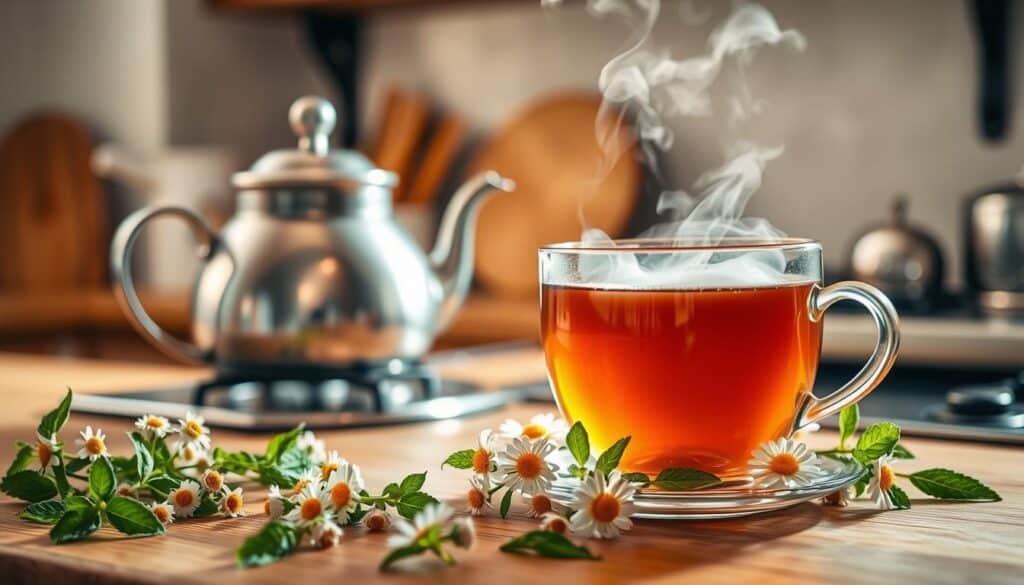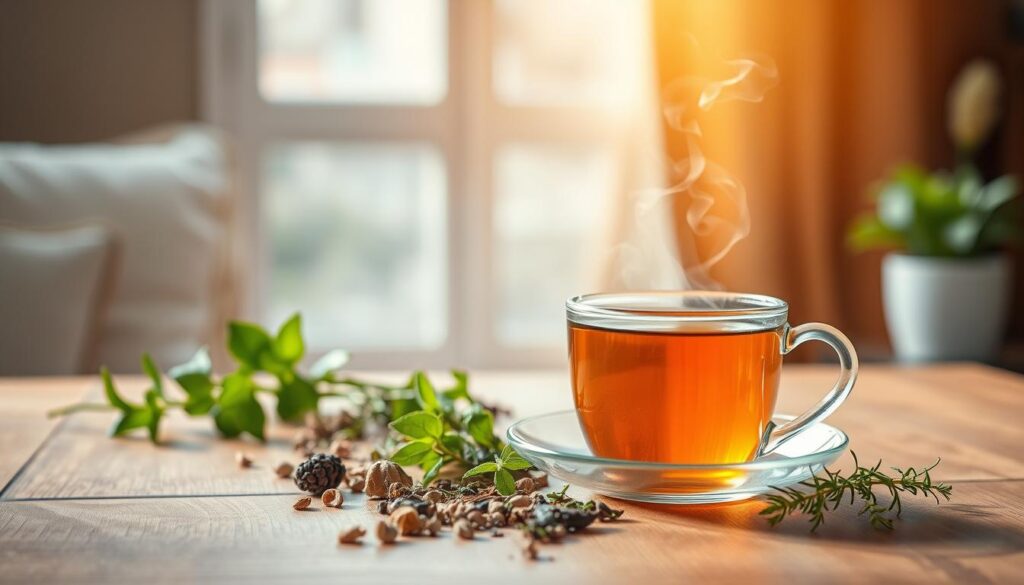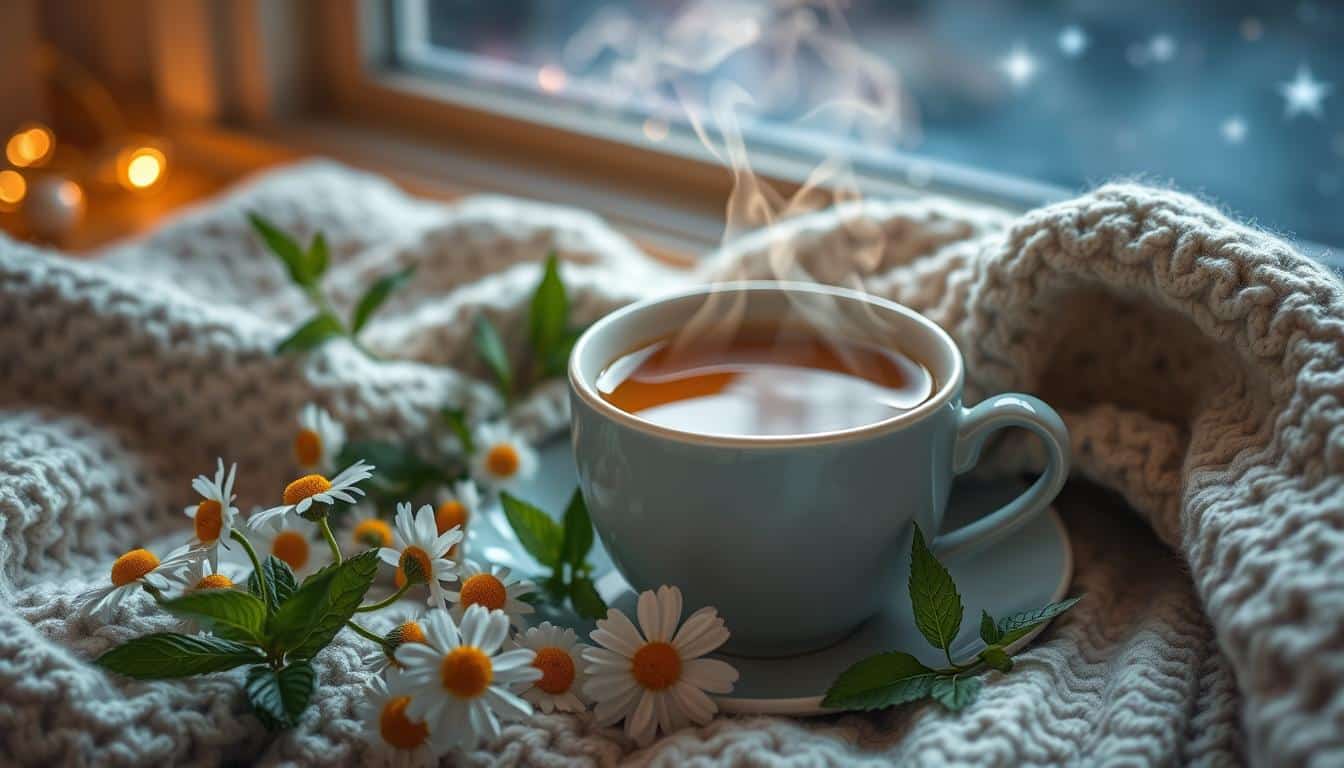What type of tea is Sleepytime tea? If you enjoy a calming bedtime ritual that helps you unwind and achieve a peaceful sleep, you’re in for a treat! Sleepytime tea is celebrated for its caffeine-free, herbal blend that soothes the mind and body. In this article, we’ll explore what type of tea is Sleepytime tea, uncover its unique blend of calming ingredients, and answer your burning questions like, can it really improve your sleep quality?
Whether you savor a warm cup before bed or simply appreciate its aromatic blend to relax, there’s much to discover about Sleepytime tea. Let’s dive into the details.
Understanding Sleepytime Tea: A Bedtime Ritual
Sleepytime tea, made by Celestial Seasonings, is a favorite for relaxation and sleep. It was introduced in 1972 and quickly became popular for a good night’s sleep. Its calming ingredients, like chamomile, valerian, and lemongrass, work on the nervous system.
The Science Behind Bedtime Teas
Herbal teas, like Sleepytime, help relax and improve sleep. They work with brain chemicals to calm the mind and body. Ingredients like chamomile and valerian have been shown to help people sleep better.
“Sleepytime tea was a game-changer for me. After struggling with insomnia for years, this bedtime ritual has become an essential part of my nightly routine. The calming herbs in this tea help me unwind and fall asleep faster, without any of the side effects of over-the-counter sleep aids.”
If you’re looking for a calming bedtime routine, Sleepytime tea is a great choice. It’s a natural way to get a good night’s sleep. By knowing how it works, you can enjoy the benefits of a peaceful night’s rest.
The Core Ingredients of Sleepytime Tea
Sleepytime tea is a favorite for bedtime. It’s known for its calming effects. The main ingredients are:
- Chamomile: A daisy-like flower, chamomile is key in Sleepytime tea. It has apigenin, which helps you relax.
- Spearmint: Spearmint adds a refreshing taste. It also helps with sleep and relaxation.
- Lemongrass: Lemongrass has a lemony smell and taste. It makes Sleepytime tea soothing.
Sleepytime tea also has other calming herbs. These include tilia flowers, blackberry leaves, orange blossoms, hawthorn, and rosebuds. These add to the tea’s flavor and health benefits.
“Sleepytime tea’s mix of chamomile, valerian, and lemongrass is known to relax and improve sleep.”
A study with 40 healthy adults showed sleep tea’s benefits. It had valerian root and passionflower. Chamomile tea also helped new mothers sleep better and feel less depressed.
Sleepytime tea uses calming herbs to help you relax. It’s designed to prepare you for a good night’s sleep.
What Type of Tea is Sleepytime Tea?
Sleepytime tea is an herbal tea or tisane. It’s different from regular teas because it’s caffeine-free. It’s made from herbs, flowers, and spices, not tea leaves.
Herbal Blend Classification
Sleepytime tea is a mix of calming herbs like chamomile, spearmint, lemon balm, and valerian root. These ingredients are chosen for their ability to help you relax and sleep better.
Tisane vs. Traditional Tea
Tisanes, like Sleepytime tea, don’t come from the Camellia sinensis plant. They’re made by steeping herbs, flowers, and spices in hot water. This makes them a great choice for a bedtime drink.
Caffeine Content Analysis
Sleepytime tea has no caffeine at all. This makes it perfect for unwinding before bed. The herbs in Sleepytime tea, like valerian root and passionflower, can also help improve your sleep.
| Ingredient | Benefits | Caffeine Content |
|---|---|---|
| Chamomile | Promotes relaxation and sleep | Caffeine-free |
| Valerian Root | Helps reduce insomnia and improve sleep quality | Caffeine-free |
| Lemon Balm | Reduces stress and anxiety, aiding sleep | Caffeine-free |
| Spearmint | Provides a soothing, calming effect | Caffeine-free |
Chamomile: The Star Ingredient
Chamomile is the main ingredient in Sleepytime tea, known for its sleep and relaxation benefits. It has been used for centuries to help with insomnia and stress. Chamomile has an antioxidant called apigenin, which may help reduce anxiety and promote sleep.
The calming aroma of chamomile is a key part of bedtime teas, like Sleepytime tea. The recipe for Sleepytime tea includes 3 parts chamomile, 2 parts peppermint, and 2 parts lemon balm. It also has 1 part lavender, 1 part passionflower, 1 part catnip, and 1/4 part valerian root.
Other ingredients like lemon balm, lavender, and passionflower also calm the nervous system. Lemon balm has rosmarinic acid, which can improve mood and calmness. Lavender is known for its ability to relax muscles and help you sleep due to linalool and linalyl acetate.
“Chamomile has been used for centuries as a natural remedy for insomnia and stress.”
The mix of these herbs in Sleepytime tea makes a great bedtime ritual. It helps you relax and sleep well. If you’re looking for a natural way to sleep better, Sleepytime tea is a good choice.
Benefits of Drinking Sleepytime Tea
Sleepytime tea is more than a cozy bedtime ritual. It offers many benefits that can improve your well-being. It can help you sleep better, reduce stress, and aid digestion. This herbal blend is a powerful ally for better rest and relaxation.
Sleep Enhancement Properties
Studies show that chamomile tea, a key ingredient in Sleepytime tea, improves sleep. New mothers who drank chamomile tea daily for two weeks slept better than those who didn’t. Elderly patients who took more chamomile extract also slept better, showing its sleep-promoting effects.
Stress Reduction Effects
Sleepytime tea’s calming blend of herbs, like chamomile, valerian root, and lemon balm, soothes the nervous system. These ingredients help reduce stress and anxiety symptoms, which can disrupt sleep. Sleepytime tea promotes relaxation, leading to better sleep and overall well-being.
Digestive Benefits
Sleepytime tea also offers digestive benefits. Herbs like chamomile and peppermint have anti-inflammatory effects. They can soothe digestive discomfort and support gut health. Adding Sleepytime tea to your bedtime routine may improve digestion and reduce nighttime discomfort.
“Drinking chamomile tea before bed has become a staple in my nightly routine. I find it helps me wind down, feel more relaxed, and fall asleep faster. It’s a game-changer for my sleep quality.”
Seeking better sleep, reduced stress, or improved digestion? Sleepytime tea is a valuable addition to your self-care. It uses natural herbal ingredients to help you sleep better and feel more relaxed.
How to Properly Brew Sleepytime Tea
Making the perfect cup of Sleepytime tea is key to enjoying its benefits. Here are simple steps to make a soothing and tasty drink:
- Use one tea bag per cup of hot water.
- Steep the tea for 4-6 minutes, or longer for a stronger flavor.
- Ensure the water temperature is just below boiling, around 200°F (93°C), to extract the optimal flavors and benefits from the herbs without scorching them.
The secret to brewing the perfect Sleepytime tea is patience and paying attention to details. By following these steps, you’ll make a comforting and aromatic cup. This cup can help you relax and get ready for a good night’s sleep.
| Ingredient | Ratio |
|---|---|
| Chamomile | 3 parts |
| Peppermint | 2 parts |
| Lemon Balm | 2 parts |
| Lavender | 1 part |
| Passionflower | 1 part |
| Catnip | 1 part |
| Valerian Root | 1/4 part |
The DIY Sleepytime tea recipe combines these special ingredients. Each one adds to the tea’s calming and sleep-promoting effects.

“A good night’s sleep is essential for our overall health and well-being. Sleepytime tea can be a valuable tool in your sleep routine, helping you unwind and prepare for a restful night.”
Best Time to Drink Sleepytime Tea
Getting the most out of Sleepytime tea means drinking it at the right time. The best time is 30-60 minutes before you want to go to bed. This lets the tea’s calming effects work, helping you relax and sleep better.
Optimal Timing for Maximum Benefits
Drinking Sleepytime tea 30-60 minutes before bed can really help your sleep. The mix of chamomile and valerian root helps you relax and sleep better. Drinking it at the right time boosts its sleep benefits.
Recommended Serving Suggestions
- Stick to 1-2 cups of Sleepytime tea in the evening.
- Don’t add sugar or sweeteners, as they can ruin the tea’s calming effect.
- Make drinking Sleepytime tea a regular part of your bedtime routine to see better results.
Everyone reacts differently to Sleepytime tea’s ingredients. Listen to how your body feels and adjust your drinking accordingly. If you keep having problems sleeping, talk to a doctor.
“Drinking Sleepytime tea about 30-45 minutes before bedtime can help you fall asleep faster and sleep more soundly throughout the night.”
| Sleepytime Tea Consumption | Benefits | Potential Considerations |
|---|---|---|
| Drink 1-2 cups 30-60 minutes before bed |
|
|
Adding Sleepytime tea to your bedtime routine can make your nights more restful and refreshing.
Comparing Sleepytime Tea with Other Bedtime Teas
Sleepytime tea is a favorite for many looking for a calming bedtime ritual. But, it’s not the only herbal tea for relaxation and sleep. Teas with valerian root, lavender, or passionflower offer different benefits and tastes.
Sleepytime tea is loved for its mild flavor and natural ingredients. Yet, other teas can offer more sleep benefits. They help with stress, digestion, and more.
Herbal Tea Varieties for Bedtime
- Valerian Root Tea: It’s known for calming effects, helping with insomnia and sleep quality. But, it might cause headaches or dizziness in some.
- Lavender Tea: Lavender’s soothing aroma and properties make it great for relaxation and sleep. Studies show it improves sleep quality.
- Passionflower Tea: It’s valued for boosting GABA levels in the brain. This can reduce anxiety and help with sleep.
While Sleepytime tea is popular, trying other bedtime teas can offer a more tailored sleep experience. Knowing the differences helps find the right tea for your needs and taste.
“Chamomile tea has been associated with reducing symptoms of depression in new mothers as per research.”
Potential Side Effects and Precautions
Sleepytime tea is usually safe, but it’s good to know about possible side effects and precautions. Some people might have allergic reactions to the herbs in Sleepytime tea, especially if they’re sensitive to ragweed. Pregnant women and those on certain medications should talk to their doctor before drinking it regularly.
Who Should Avoid Sleepytime Tea
- Pregnant or breastfeeding women: The safety of Sleepytime tea during pregnancy and lactation has not been conclusively established. It’s best to avoid this tea unless approved by a healthcare professional.
- People with ragweed allergies: The chamomile and lemon balm in Sleepytime tea may trigger allergic reactions in those with sensitivity to ragweed and related plants.
- Individuals on blood-thinning medications: Chamomile tea has been reported to interact with the blood thinner warfarin, potentially increasing the risk of bleeding.
- Patients taking sedative medications: Valerian, a key ingredient in Sleepytime tea, can enhance the effects of sedatives like benzodiazepines and barbiturates, leading to excessive drowsiness.
Medication Interactions
Sleepytime tea may interact with certain medications, so it’s crucial to consult a healthcare professional before regular consumption. Some potential interactions include:
- Blood thinners: Chamomile and ginger in Sleepytime tea may increase the risk of bleeding when combined with blood-thinning medications.
- Diabetes medications: Goldenseal, another ingredient in Sleepytime tea, has the potential to reduce the effectiveness of diabetes medications like metformin.
- Sedatives: The valerian in Sleepytime tea can amplify the effects of sedative medications, leading to excessive drowsiness.
It’s important to be aware of the potential side effects and precautions when using Sleepytime tea. By talking to a healthcare provider and knowing about possible interactions, you can enjoy a safe and beneficial tea-drinking experience.

Storage and Shelf Life
Keeping your herbal tea, like Sleepytime tea, fresh is crucial. Store it in a cool, dry spot. Make sure it’s away from sunlight and strong smells.
Sleepytime tea stays fresh and flavorful for 18-24 months if stored right. Always check the expiration date. Keep the tea bags sealed to keep the herbs and spices fresh.
- Store Sleepytime tea in a cool, dry place away from direct sunlight and strong odors.
- Properly stored, Sleepytime tea can maintain quality for up to 18-24 months.
- Check the expiration date on the packaging and ensure the tea bags remain sealed until use.
Follow these tips to keep your Sleepytime tea fresh. This way, it’s always ready to help you relax and unwind.
Alternative Uses for Sleepytime Tea
Sleepytime tea is not just for bedtime. It has many other uses. Herbal tea lovers can find new ways to enjoy this calming drink.
Relaxing Bath Soak
Adding Sleepytime tea to a warm bath is a great idea. Steep the tea, let it cool, and then add it to your bath. The herbs in the tea, like chamomile, can make you feel calm and help you sleep better.
Facial Steam Treatments
Use Sleepytime tea for a facial steam. Brew a strong cup, pour it into a bowl, and lean over the steam. Cover your head with a towel to trap the vapors. This opens your pores, hydrates your skin, and reduces stress.
Cooling Eye Compress
Let the tea cool, then soak a cloth in it. Use it as an eye compress. Chamomile in the tea can reduce puffiness and soothe tired eyes.
Culinary Versatility
You can use Sleepytime tea in baked goods and desserts. It adds a special flavor to cookies, cakes, or popsicles. The tea’s herbal taste is calming and unique.
Exploring these uses shows how versatile Sleepytime tea is. It’s great for relaxation, self-care, or cooking. This herbal blend can make your daily life better in many ways.
| Herbal Ingredient | Potential Benefits |
|---|---|
| Chamomile | Improving sleep quality, reducing anxiety, aiding digestion |
| Valerian Root | Treating insomnia, reducing anxiety and stress, alleviating menstrual cramps |
| Lemon Balm | Promoting relaxation, reducing anxiety, improving cognitive function |
| Spearmint | Relieving digestive issues, reducing inflammation, enhancing cognitive performance |
“Sleepytime tea is more than just a bedtime beverage – it’s a versatile herbal ally that can be leveraged for a variety of self-care and wellness applications.”
Conclusion
Sleepytime tea is a special herbal mix that helps you sleep better and relax. It has chamomile, spearmint, and other calming ingredients. These can improve sleep, lower stress, and help with digestion.
Even though Sleepytime tea is mostly safe, it’s smart to watch how your body reacts. Talk to a doctor, especially if you use it a lot or have health issues.
Looking for a way to calm down before bed? Sleepytime tea might be just what you need. It’s backed by history and science, making it a great choice for a good night’s sleep. Try it out and see what works best for you.
The Sleepytime tea benefits and the power of herbal bedtime tea are big reasons to try it. Knowing the ingredients, how to brew it, and any safety tips can help you enjoy it fully.
FAQ
What type of tea is Sleepytime tea?
Sleepytime tea is an herbal blend, also known as a tisane, made by Celestial Seasonings. It’s a caffeine-free tea meant to help you relax and sleep better.
What are the main ingredients in Sleepytime tea?
Sleepytime tea includes chamomile, spearmint, lemongrass, tilia flowers, blackberry leaves, orange blossoms, hawthorn, and rosebuds.
When was Sleepytime tea introduced?
Celestial Seasonings introduced Sleepytime tea in 1972. It quickly became a natural choice for those seeking better sleep.
How does Sleepytime tea work to promote relaxation and better sleep?
The calming herbs in Sleepytime tea, like chamomile, help relax the nervous system. This can improve sleep quality.
Is Sleepytime tea caffeine-free?
Yes, Sleepytime tea is caffeine-free. It doesn’t contain any tea leaves from the Camellia sinensis plant.
What are the potential benefits of drinking Sleepytime tea?
Drinking Sleepytime tea may help you sleep better, reduce stress and anxiety, and aid digestion.
How should Sleepytime tea be brewed?
To brew Sleepytime tea, use one tea bag per cup of hot water (just below boiling at around 200°F or 93°C). Steep for 4-6 minutes.
What is the best time to drink Sleepytime tea?
For the best results, drink Sleepytime tea 30-60 minutes before bedtime. This allows the calming effects to take hold.
Are there any precautions or potential side effects associated with Sleepytime tea?
Some people might have allergic reactions to Sleepytime tea’s ingredients. Always check with a healthcare provider if you have health conditions or are on medications.
How should Sleepytime tea be stored?
Store Sleepytime tea in a cool, dry place away from sunlight and strong smells. Keep the tea bags sealed until you use them to keep the tea fresh and potent.

